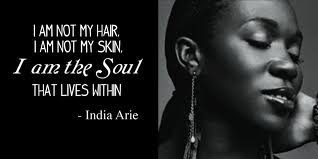by: Kathryn Kay Coquemont
India Arie’s “I Am Not My Hair” is a symbolic anthem communicating that people (particularly those from the Black/African American community) are more than the social identities we use as labels. She sings, “I am not my hair / I am not this skin / I am not your expectations, no / I am not my hair / I am not this skin / I am the soul that lives within”. Although many found these lyrics empowering, others were quick to point out that systemic oppression often does relegate people of color to embody a single dimensional identity. As a woman of color, my permitted identity is often determined by those with more privilege and power than I have. Every day, I navigate the world trying to determine if my racial or my gender identity is more salient in the current space I inhabit. I can only imagine and listen to stories about how much more difficult it is for women with additional marginalized identities to cope with social expectations.
In higher education, we are beginning to discuss intersection of social identities. However, we are far from constructively supporting intersection. To find appropriate resources, students must go to a disability resource center for ADA accommodations, a multicultural center for racial and ethnic advocacy, a LGBTQ center or women’s center for gender identity support and sexual orientation community, an international center for overcoming nationality barriers…shall I go on? And our professional spaces are not much better.
At an annual conference this spring, I served in a few leadership roles for the professional association hosting the event. One was for an Asian American and Pacific Islander community and another was for a women’s group. Both are formally recognized by the association and, as such, had prescribed meeting times. Unfortunately, when I examined the schedule, I realized both Board meetings occurred at the same time. I immediately felt anxious. How would I decide where to be? Choosing one over another seemed like I was choosing one identity as more meaningful, when both my gender and my race are critical to how I function as a professional and a person. I was reminded how rare it can be to have my full-self acknowledged, despite the progressive nature of the field of education. At this point, I felt like I approached an intersection, hoping to merge seamlessly among lanes, and instead met with a collision.
In my job, I often do not have the time to reflect on the emotional impact single-identity spaces have on me, the way they steal a part of my identity and take away my autonomy to choose how I am recognized and acknowledged. However, in that moment I felt waves of emotion as I decided to prioritize my race over my gender identity. As I mentioned, this situation was not intentional on the Association’s part, but it should have been. Only by actively recognizing the importance of multiple identities can we become better at constructing more inclusive environments in our workplaces, on our campuses, and in society. Without living and working with intention, we are relegated to singly being our hair, our skin, our gender, or any other one-dimensional version of ourselves. As my friend and colleague Aysha Daniels reminds me, intersectionality must be at the forefront of our work if we are to shift the narrative to a more inclusive story. Although it is difficult to tear down the walls that separate identities from one another (as is literally the case when looking at support centers in institutions of higher education), we must share our stories of collision and intersection to educate why the walls intended for safety sometimes imprison us instead.
 Kathryn Kay Coquemont is currently at the University of Utah, serving as the Director of New Student & Family Programs, an Instructor in the Leadership Studies program, and a Ph.D. student in the Educational Leadership & Policy program. Her other professional experience includes student activities, leadership programs and education, intergroup racial dialogues, sexual assault education and prevention, and change management business consulting. Kathryn is a partner, mother of three, and passionate social justice advocate. Her research interests include Asian American student success, intersection of identity, ethical leadership, and graduate student professional development. You can follow her on Twitter @katcoquemont.
Kathryn Kay Coquemont is currently at the University of Utah, serving as the Director of New Student & Family Programs, an Instructor in the Leadership Studies program, and a Ph.D. student in the Educational Leadership & Policy program. Her other professional experience includes student activities, leadership programs and education, intergroup racial dialogues, sexual assault education and prevention, and change management business consulting. Kathryn is a partner, mother of three, and passionate social justice advocate. Her research interests include Asian American student success, intersection of identity, ethical leadership, and graduate student professional development. You can follow her on Twitter @katcoquemont.
